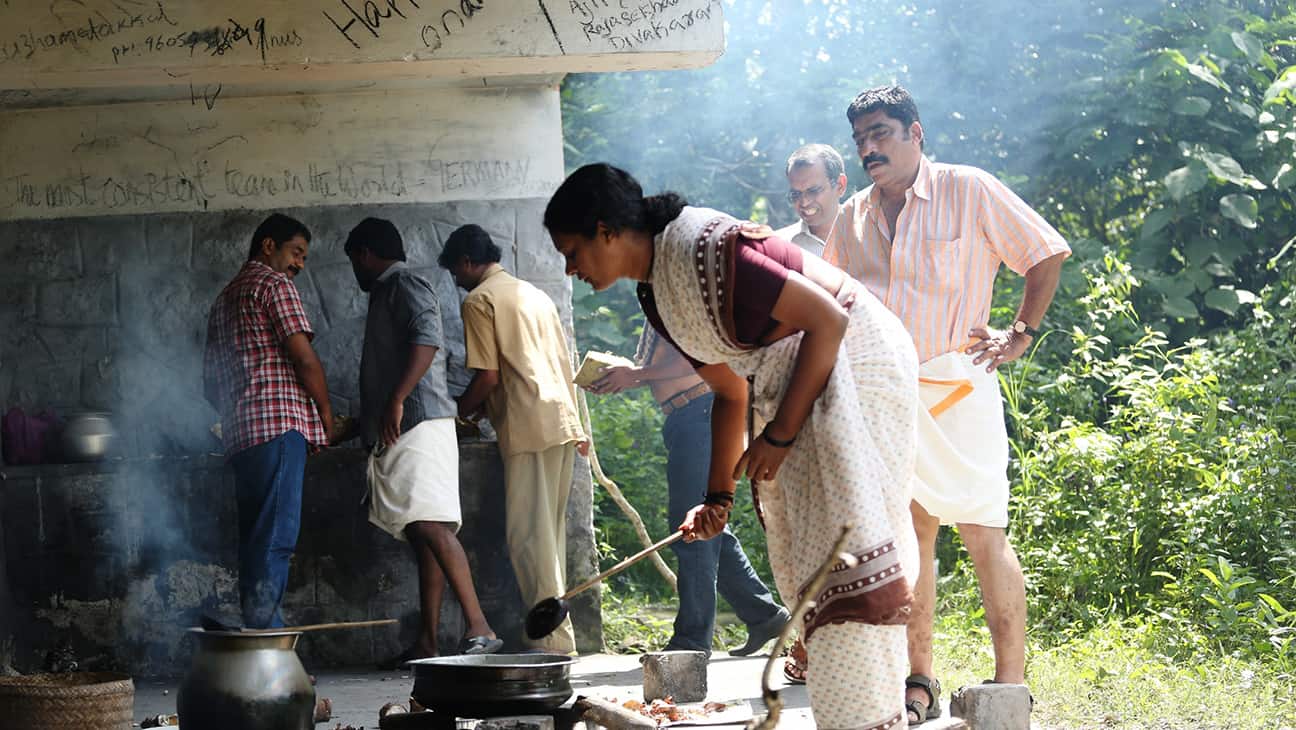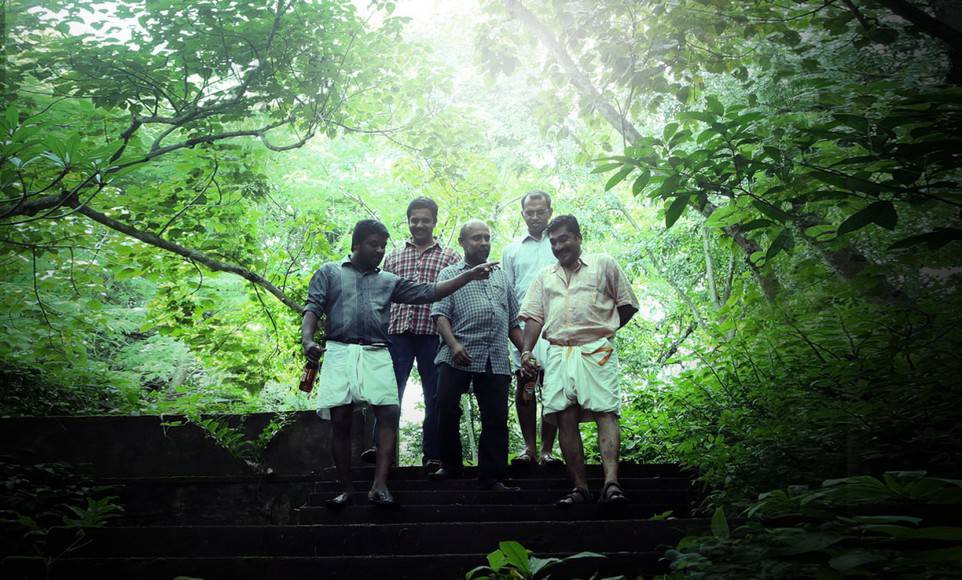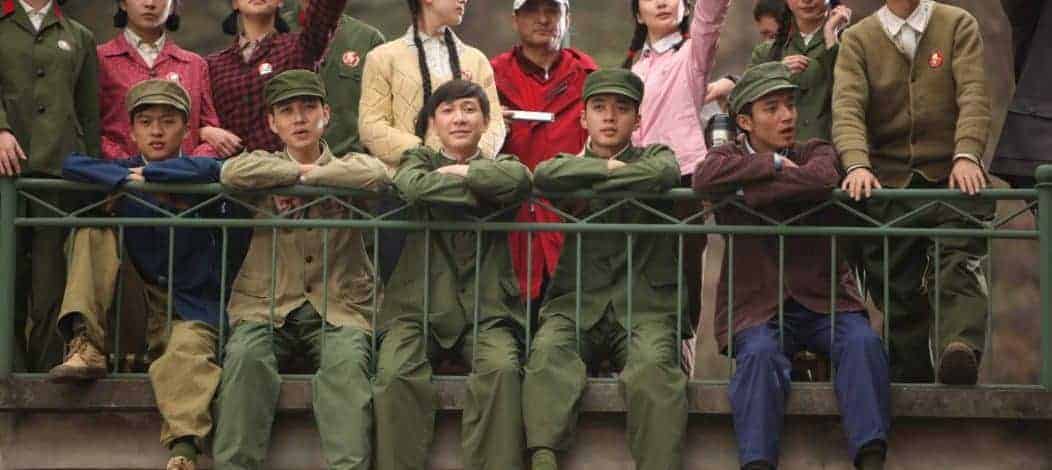By Shounak Majumdar
Sanal K Sasidharan is one true maverick maestro who has come up in recent times in Indian cinema. His Malayalam films are rooted in the land he lives in yet they resonate with vibrant emotions with the rest of the country. His second feature length film ‘An Off-Day Game' is based on a story by Unni R. On the eve of the state election, five middle-aged men get a day off. They decide to enjoy their day off by commuting to a desolate place that the director never really describes to us. Therefore, it carries certain mysticism with it. As soon as they get there the service woman Geetha (Abhija Sivakala) attracts their attention. The silent greedy gaze that hovers around her body in a safe distance wraps the viewer in deep claustrophobia.

Sasidharan's shooting mode in ‘An Off- Day Game' is unique in Indian cinema; in some parts it might resemble with Tamhane's ‘Court'. By keeping the camera far from the centre of action and by eschewing closer shots, he dispels the need for engagement. He treats his subject almost in a cold, objective and clinical way. His superbly doctored dialogues seem as if they are flowing from someone suffering Delirium. They start their picnic as alcohol cans are opened and chicken gets on the stove. Geetha cooks for them and another service boy helps her. The story behind the chicken is an interesting one. When a need for killing a rooster arrives, we see how many unnerving moments it brings forth to the men. Ultimately, Dasan (Baiju Neto) who is dark skinned and bullied by boisterous Dharman (Nishthar Sait) all the time has to be the man putting foot in the shoe.
Two men out of these five, Vinayan and Dharman, actively pursue Geetha. Vinayan (Pradeep Kumar) does not go far because of his faltering courage but Dharman proceeds and gets slapped in result. The use of lightning sound while Dharman gets slapped subtly underlines the mood. Upon returning with tweaked self-pride, Vinayan sparks of a debate by putting his view on ‘consent', justifying his behaviour with Geetha. His friend Ashokan (Arun Nayar), however, does have a differing opinion. Ashokan thinks it is a celebratory, machismo act to mount and conquer a woman. Upon hearing this, Vinayan gets enraged and calls him a rapist.

“An Off Day Game” is unique also because it presents several perspectives which collide head on in an unbiased way. Content can engage us but it is the form that propels the mind to reason with the cause-effect relationship shown on screen. One of the best, form-oriented decisions of Sasidharan is to keep the camera in an elevated CCTV-like position where six intoxicated men confront Geetha while she is asking for her rightful wages. This narrative gaze has an overpowering nature, it thrusts the viewer with an uncanny foresight as if some uneventful fate is waiting for these boorish men.
It is quite amazing to note that in the manly world of ‘An Off -Day Game' through the unfolding images and sound we understand that not a single character stands straight to their ideologies apart from Geetha. These brilliant script turns these powerful men into voyeurs lingering in gardens and balconies by using Geetha's character perfectly.
After getting slapped by Geetha, Dharman returns and suddenly brings up ‘The Emergency' in the table. It is exhilarating to see how the director addresses the deconstruction of the meaning of Emergency by several perspectives, all of which are laden with personal histories and all these men see this historic event differently.
‘An Off -Day Game' projects topics of caste, gender, politics and explores the hearts of a few nefarious, flawed men which are hitherto unexplored in this manner in Indian cinema. We are into the realm of misogynist men who are bunking their duties at the polling booths and drinking, we are into the world of dishonest government officials who issue certificates for money. Ambience sound is used ambitiously in this film, many a times it almost drowns the dialogues. We understand the auteur's motive here. He does not want us to listen to these men. He wants us to listen to the nature. Sasidharan's camera does not glorify the beauty of the location rather it makes it the setting of a grim tale. By using repetitive shots of water and trees, he expels the exotica and brings out the natural.
The most striking sequence meets us towards the end of the film when the adults decide to play a children's game. The game has simple rules and it has to be played with 4 players. It features one king, one minister, one policeman and one thief. The policeman has to guess the other three and if his guess is wrong he will be punished, if he guesses the thief rightly he can proffer punishment. But there are five men here. Naturally one has to go out. The men at concern choose thread-bearing Brahmin Thirumeni to be out of the game, he then becomes the magistrate. The game starts with a jolly drunk note but ends with a horrific imprint on the viewer's mind.
Sasidharan treats this game as a subunit of the contemporary Malayali society. When chits unfold, Ashokan gets to be the police representing the state power and he incongruously chooses Dharman as the thief. But incidentally, fair skinned, boisterous Dharman with his aspirations to be a King becomes one with the chit. Ashokan fails, and according to the rule of the game he now needs to be punished. Mirroring our society could be achieved in no better way when Ashokan introduces bribing in the game. He proposes a bribe of Rs.500 to king Dharman. Dharman accepts his proposal and also makes magistrate Thirumeni happy by endowing him with imaginary Rs.200. But what fares for fair skinned Ashokan or Dharman does not fare for dark skinned Dasan. Dasan meets his deadly and unforgettable end from the hands of his friends upon unfolding his chit where the word thief was written.

All this is steadily captured in the last shot which goes on for 53 minutes, another achievement that is up until now hardly thought on Indian cinema, even in the independent sector.
It is extremely thoughtful of Sasidharan that he treats Dharman, Ashokan and men like them as agents of the failing political richness in Kerala. He starts the film by using a lot of footages from the voting day. With the stipulated budget he cannot afford to capture all this by staging therefore his treatment makes it look very real. We first identify Dharman in a political gathering. One of his friends goes and takes him out of that gathering. The continuous commentary that goes on the television simultaneously is evocative. This gives the film a very outwardly political feeling apart from its obvious inner political nuances. Also, the way it plays with the lament of the probable downfall of communist regime in Kerala by comparing it to Bengal is very intriguing.
The title sequence (where the film and the game both are introduced) carries a joyous, lively music; soon the grim theme of the film takes over as a car crosses through a dense forest. Apart from technical faculties like fluid camera or earthy sound tracks, acting is extremely rich in this film; I would specially mention Abhija Sivakala, Baiju Netto and Nisthar Sait for their invigorating and realistic performances.
‘An Off- Day Game' has been screening extensively, also it is on Netflix. Therefore, I don't think it deserves to be called a hidden gem now but it definitely is a pearl of rarest kind in new Malayalam cinema.















